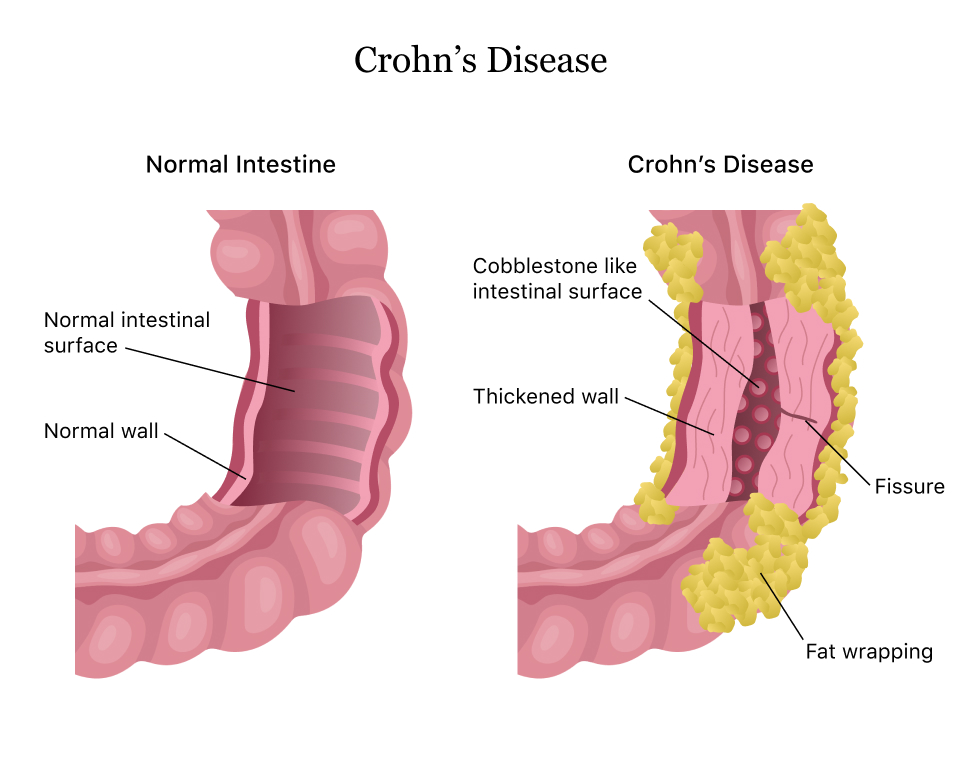New trial in Glasgow University offers hope for Crohn’s disease patients
The recent decades have been characterised by spread of several lifestyle-related diseases as people around the world move to a more sedentary life, along with a deterioration in eating habits, moving towards fast food or junk foods, loaded with fats and calories and lacking basic nutrients.
While earlier diseases like obesity, heart diseases, diabetes were more prevalent in the western nations, the last two decades have seen a spread of these worldwide, particularly a sharp rise incidence rates in newly industrialised countries that have adopted a westernisation of lifestyle. While rates of surgery have experienced a temporal decline attributable in part to increasing availability of medical treatments, earlier initiation of effective therapy, and changes in clinical practice, the healthcare costs associated with these diseases have continued to increase, in part due to costly therapies.
One such ailment is Crohn’s disease, which is a type of inflammatory bowel disease (IBD). It causes inflammation or swelling of the tissues in the digestive tract, which can lead to abdominal pain, severe diarrhea, fatigue, weight loss and malnutrition.
A new clinical trial, aimed at improving treatment options for patients with Crohn’s disease, is to begin in Scotland. Led by the University of Glasgow and NHS Greater Glasgow and Clyde (NHSGGC) in collaboration with hospitals around Scotland, the Biopic Study will evaluate the use of Partial Enteral Nutrition or (PEN), in which patients replace half of their normal diet with liquid-only prepared supplements. The study is being funded by a USD 2.1m grant from The Leona M and Harry B Helmsley Charitable Trust and will begin in October 2022.
According to the University of Glasgow, Crohn’s disease is a chronic condition which currently affects more than 115,000 people in the UK and causes inflammation of the lining of the digestive system. Symptoms can often be debilitating and can include diarrhoea, blood in stools, abdominal pain, and weight loss. Crohn’s disease is incurable, though it can be managed with treatments. Current options include biologic medication that can slow or stop damaging inflammation, or Exclusive Enteral Nutrition (EEN), a liquid-only diet consisting of prepared supplements administered over a six to eight week period.
A press statement by the University of Glasgow says that unfortunately, no currently available treatment provides an effective solution for all patients. Prescribed medications are only effective in around 40-50 pc of patients, with 20 pc of people losing their response to drugs every year. EEN is very effective for treating active Crohn’s disease. However, as it requires that patients only consume prepared supplements, with no solid food allowed for up to eight weeks, it can be very challenging to adhere to.
The press statement adds that aiming to help improve patient outcomes, the Biopic Study will recruit 80 people with active Crohn’s disease who need treatment with biologics from six hospitals across Scotland. Patients will randomly be allocated to either standard treatment with biologics, or to treatment with biologics plus PEN for six weeks.
The research team will go on to assess whether the combination of biologics and PEN will improve patients’ overall response to medications and prolong their disease remission, when compared with patients who are only being treated with biologics.
The statement adds that the research team will also measure the impact of the two treatment regimens on patients’ quality-of-life, their body composition and micronutrient levels. Additionally, since gut bacteria have been implicated as a contributing factor to the development of Crohn’s disease, the study will explore how each of these two treatment regimens change the gut microbial composition and function, and how these changes relate to changes in disease markers.
“This novel dietary regime has the potential to transform the current treatment of Crohn’s disease, offering better disease control and a better quality of life for patients. Understanding the role of the microbiome in this process and its interaction with the diet and biologic therapy will also offer insights into the underlying pathogenesis of Crohn’s disease and may inform the development of novel personalised nutritional therapies. This high calibre study adds to our current research portfolio which aims to unravel the dietary causes of Crohn’s disease and to develop tolerable, side-effect free dietary therapies for long-term disease management,” says Konstantinos Gerasimidis, Professor of Clinical Nutrition at the University of Glasgow.
“Combining drug and dietary therapies as a strategy is a novel and exciting approach in Crohn’s disease research and we’re delighted to be playing such a key role in a study that we hope will help to improve the lives of patients. In NHSGGC, our focus is on providing the highest standard of patient-centred care at all times, and this study underlines this approach. While there is no cure for Crohn’s disease, we hope that this study will enable us to look at how we can help patients manage the condition while improving their quality of life,” says Dr Jonathan Macdonald, Consultant in Gastroenterology at NHSGGC.










